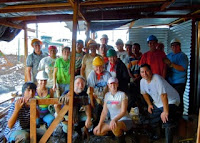 On October 3, a small group of concerned people came to St. Paul's Episcopal Church in LaSalle, Illinois to watch an important movie about a timeless topic -- poverty. The movie is called The Line; you can watch it at www.thelinemovie.com. In its 43 minutes, you will be introduced to people who have been clobbered by the economic collapse in America; the violence of poverty that lives on our streets and the nature of poverty that comes with the exploitation of our neighbors and God's creation.
On October 3, a small group of concerned people came to St. Paul's Episcopal Church in LaSalle, Illinois to watch an important movie about a timeless topic -- poverty. The movie is called The Line; you can watch it at www.thelinemovie.com. In its 43 minutes, you will be introduced to people who have been clobbered by the economic collapse in America; the violence of poverty that lives on our streets and the nature of poverty that comes with the exploitation of our neighbors and God's creation.Here are some facts for you to know and consider:
- Today, 46 million people live in poverty in the United States; this is the 3rd highest poverty rate among industrialized nations -- just ahead of Turkey and Mexico.
- The U.S. Census Bureau defines the poverty line as a family of four earning less than $23,050.00.
- The average food stamp benefit in America is $21 per week.
Here is what we decided:
- we would pray for our neighbors in poverty and for strength and guidance for how to be effective in helping; humble in service and loving in action.
- we agreed that we could volunteer and give resources to the LaSalle Food Bank. This important ministry is celebrating its 30th year of service. In 2011, 10,927 families received donations.
- we would be more intentionally "neighborly" in connecting and inviting the folks that live near St. Paul's into the life of our community.
- we would build relationship with Illinois Valley PADS (Public Action to Deliver Shelter). PADS provides shelter, food and services to people in need.
Wednesday night a small cadre of faithful believers (in a divine man that through our hands and feet still stands up for the poor and oppressed) took a step in the right direction to change the world, right here in our backyard.








